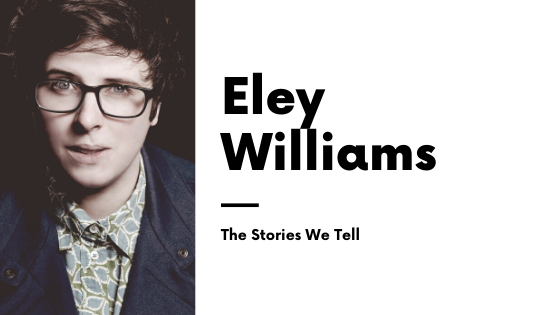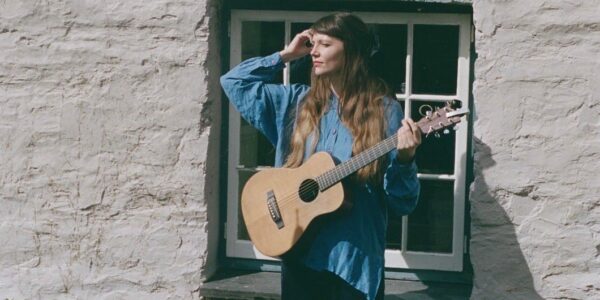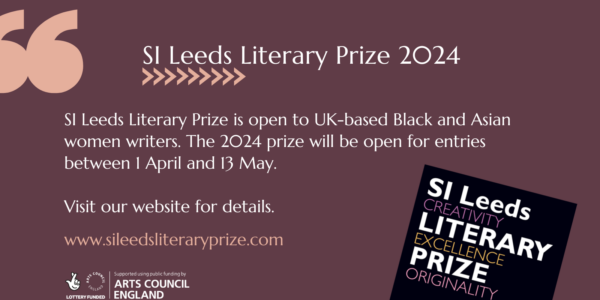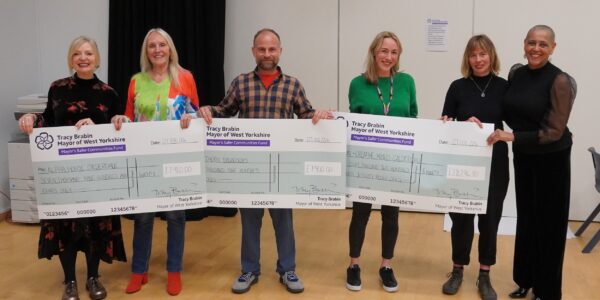The Stories We Tell – Eley Williams
05 Feb 2020 / The Stories We Tell

On Jotting – Ten Postcards
Postcard 1
I once wrote a short story titled ‘Smote’. Actually, that’s untrue: I am an unreliable narrator. I once wrote a prose-poem called ‘Smote’ but it didn’t find publication anywhere, so I entered it for a short story competition.
‘Smote’ is about two people kissing – or, more precisely, one person failing to kiss another person – in front of a painting by Bridget Riley. The characters spend a lot of the story’s time (and the reader’s patience) dithering. At one point, they examine postcards in a gallery’s giftshop as they put off something inevitable.
The story was written from the first-person point of view. The narrator is not based on me, nor is the story based on my direct experiences. I have never failed to kiss anyone in front of a painting by Bridget Riley.
Postcard 2
As the story in ‘Smote’ progresses and the central character undergoes anxious throes of tentativity mixed with desire, the text begins to lose its full-stops and becomes one long sentence. I was hoping to enact a kind of breathlessness for the reader as the plot develops, where allusive scattered thoughts are communicated in correspondingly freewheeling, slightly unhinged, run-on sets of phrases.
I’m not sure if tentativity is a word. If it is (and I would so like it to be) I would also hope attentitivity could be added to this lexicon we’re creating between us, writer and reader: our own personal little dictionaries we carry around in our heads.
Attentitivity (n.) pertaining to alert nervousness or unsure alertness.
Passages in texts can be shared labyrinths, or shared Ariadne’s threads through the maze.
Postcard 3
I had the opportunity last year to run a course for the Poetry School with the wonderful writer David Hayden. It was about writing short stories. We called the course ‘On Noticing and Startling’. We believed that a lot of what is powerful about short fiction resides in notions of readers (and writers) undergoing uncertainties, as much as acts of discovery. I would probably claim that for me the best short stories produce a feeling of being curious and unsettled, involving a kind of rootling around, as well as an openness to being surprised by details. The word ‘startling’ conveys something of the keening smallness involved: a very effective short story doesn’t necessarily involve grand thwarted ambitions or ornate burlesque tableaux or themes. It can be about the way light hits a windowpane. It can be about the way light never hits a windowpane.
Postcard 4
Do you know: it felt indulgent to write undergoes the anxious throes just then, up there in my second Postcard. It seemed a bit showy and/or overworked. THEY WILL THINK YOU ARE VERY WHIMSICAL, FAR TOO WHIMSICAL.
The rhyme has a pleasing swing and rhythm to it, I suppose, which is why it came out that way. Written like this, the phrasing makes its own little anxious throe in the sentence’s pattern and metre. Maybe.
Postcard 5
and honestly, if I’m in a confessional frame of mind, it also felt indulgent to use these parentheses in Postcard 2: (and I would so like it to be).
Brackets! Parentheses! The too-obvious cupped hands of the actor making an aside to the audience! And this insistent and intrusive sotto voce hiss is made all the more insistent by italics and exclamatory glyphic decisions!!!
([†‘What is this I see before me?’ etc.])
Postcard 6
Every time I think about the fact someone might read my work I am overcome with impostor syndrome. I wish this wasn’t the case but there we are.
I find it difficult to write about works of art or the effect they can have on you. Upon one. Upon me. You might know the word ekphrasis. Simply (too simply), this refers to the use of one medium to describe another. It might be, say, trying to describe a painting in words, or composing a piece of music to evoke a dance, or choreographing a dance about a poem. ‘Smote’ was an attempt to mark down with nouns, verbs and adjectives the effect that looking at a Bridget Riley had upon an onlooker; to convey how the artist’s work ‘Movement in Squares’, with its serried ranks of black and white shapes, makes a visitor to a gallery feel unsteady on their feet. How do you get across the optical illusion of monochrome squares jostling together on a canvas? How can you describe the sensation of seeing something flat and static become so apparently animated and textured when you look at it closely, even too closely?
A work of ekphrasis is a work of art about a work of art.
Postcard 7
In 1975, poet Alice Notley wrote an essay for Brilliant Corners magazine entitled ‘Modern Americans In Their Place At Chicago Art Institute: An Article’. There, she describes spending time in a specific gallery (‘I would come panting home from a visit with the paintings’) and the relationships that she developed with certain artworks or painters (‘Picasso does after all look like a waffle iron with a permanent wave […] And I could tell you about Georgia O’Keefe’s [sic] Black Cross and flower soul and the Charles Demuth calendar window, and how for the Americans there’s no light this museum before the Twentieth Century––as if American Impressionists didn’t have any right. When Mary Cassatt breaks my heart, cleanly’).
As part of this piece, she breaks from the main narrative, and we are allowed a skirmished draft of a poem that focuses on an encounter with a painting by Juan Gris:
‘At home later I would write:
I see the checkerboard through
the newspaper the table
through the checkerboard and the
checkerboard the newspaper
and the table, and the wall-
paper rose and guitar for
each and the somber tipsy glass
because painting was teaching me what a word like “tipsy” could do to the flat.’
I came across this article only recently, and it expresses so neatly and sweetly the kind of reeling force art can have upon an onlooker. It is something I wanted to get across in ‘Smote’.
Language can be a tipsy and a topsy-turvy thing.
I should read more poetry, I often tell myself, and then get distracted by something.
There is much to be startled by; there is much to distract.
Postcard 8
I mentioned the impostor syndrome that I often feel while writing.
In drafting ‘Smote’, I also wanted to touch upon a character’s experience of a kind of ‘Stendhal syndrome’. This is defined by Wikipedia as ‘a psychosomatic condition involving rapid heartbeat, fainting, confusion and even hallucinations, allegedly occurring when individuals become exposed to objects or phenomena of great beauty.’ That word allegedly is doing a lot of work there, no?
Falling in love or being entranced or losing yourself in a daydream can feel like a kind of vertigo. It is a private vertigo, potentially life-changing or life-defining, on that knife-edge between epiphany and catastrophe, that a passerby might not notice.
In many of my short stories, I try and work on how best to get the experience of these private epiphany-catastrophes across to a reader.
Postcard 9
‘I have never failed to kiss anyone in front of a painting by Bridget Riley’ was ambiguously phrased, wasn’t it?
Some of my favourite short story writers – let’s say, for example, Ali Smith – use ambiguity so powerfully. Sleights of hand without clunky or glitzy theatrics. Their stories provide material for startling.
Lots of my stories are about people who are not clear on certain details. Lots of my stories are about uncertainty generally.
Postcard 10
So: what can uncertainty do with impostor syndrome? How do we shelve it or shove it? Get over it or use it and actually put pen to paper and finish a draft? What do I do?
One way is to embrace the nervousness – attentivity – surrounding the perceived inability to ever convey a scene, a mood, a tone or image properly. Sufficiently. Yes, I say, gritting my teeth and steeling myself, the metaphors will be mixed. Yes, the tenses may get jumbled or the grammar may grow a little too cumbersome or slipshod. Some of that can be fixed. Writing a draft was never meant to be an exact science. Have fun with the experiment without dreading the result.
And once one’s allowed this to be true, once I relax a little into mistakes and insecurity and falling-short-ofness, you can be a little giddy. Make the first-person become a strange guest at the feast. You’re your narrator a pot of basil on a windowsill. Perhaps playfulness can come in again.
I say to myself, firmly: be giddy. You can shuffle things into order later.
I say to myself, winsomely: trust your instincts, or admit on paper your instincts can’t be trusted.
I say: don’t overuse adverbs
I say: see where all this advice takes you, and see what you notice.
I say: (I feel very pompous and presumptuous talking to myself like this.)
I go: (((((((that’s OK, for now)))))))
Find out more about The Stories We Tell.
 Eley Williams lectures at Royal Holloway, University of London. Her short story collection, Attrib. and Other Stories (Influx Press 2017), won the James Tait Black Prize and the Republic of Consciousness Prize. Her stories have been anthologised in The Penguin Book of the Contemporary British Short Story (Penguin Classics, 2018) and Liberating the Canon (Dostoevsky Wannabe, 2018). She is a Fellow of the MacDowell Colony and the Royal Society of Literature. The Liar’s Dictionary (William Heinemann, 2020) is her debut novel.
Eley Williams lectures at Royal Holloway, University of London. Her short story collection, Attrib. and Other Stories (Influx Press 2017), won the James Tait Black Prize and the Republic of Consciousness Prize. Her stories have been anthologised in The Penguin Book of the Contemporary British Short Story (Penguin Classics, 2018) and Liberating the Canon (Dostoevsky Wannabe, 2018). She is a Fellow of the MacDowell Colony and the Royal Society of Literature. The Liar’s Dictionary (William Heinemann, 2020) is her debut novel.



